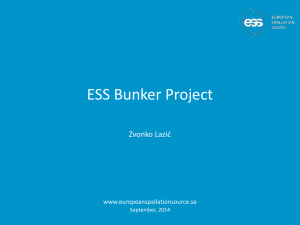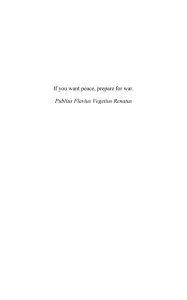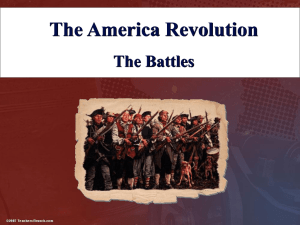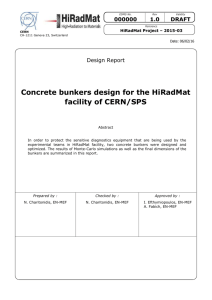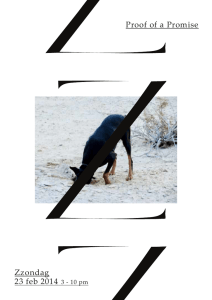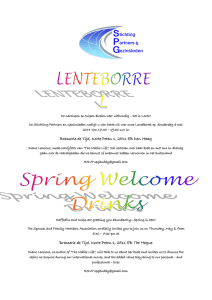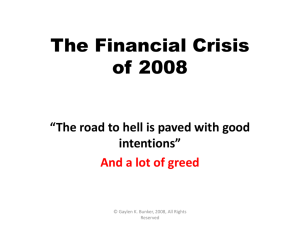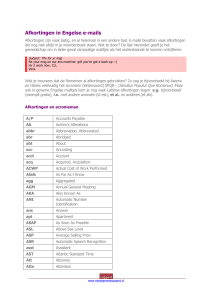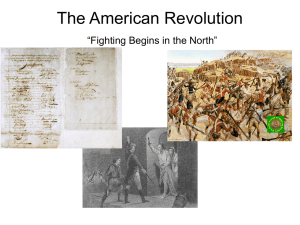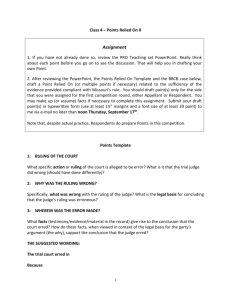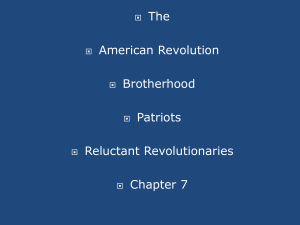afstudeerproject ingekort.indd
advertisement
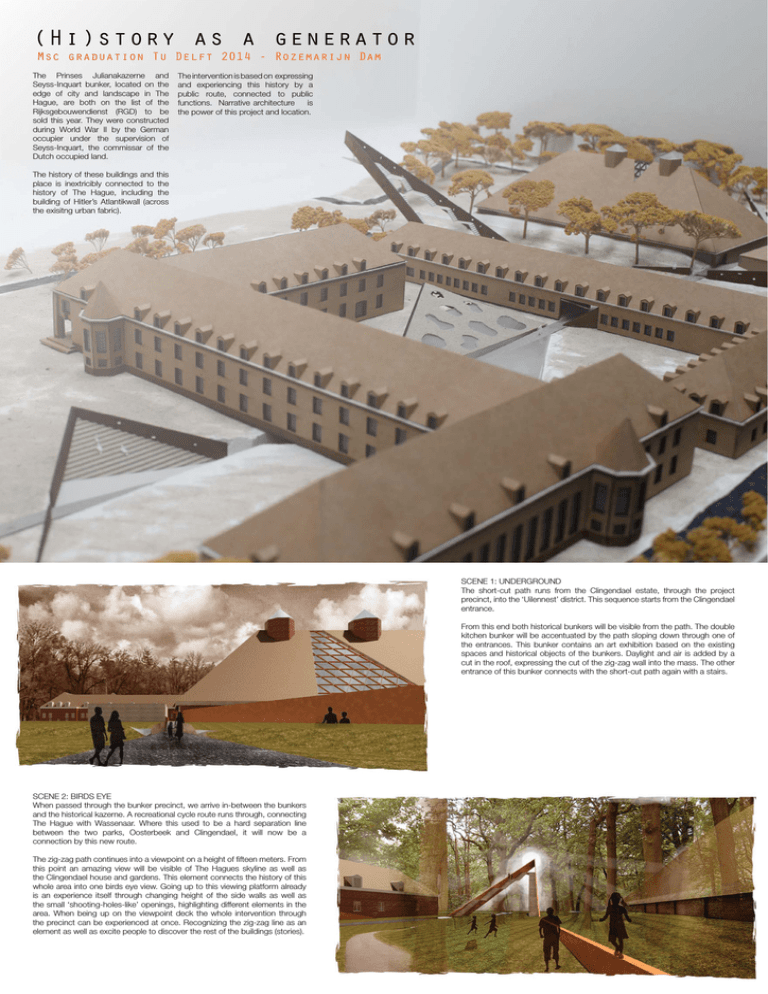
(Hi)story as a generator Msc graduation Tu Delft 2014 - Rozemarijn Dam The Prinses Julianakazerne and Seyss-Inquart bunker, located on the edge of city and landscape in The Hague, are both on the list of the Rijksgebouwendienst (RGD) to be sold this year. They were constructed during World War II by the German occupier under the supervision of Seyss-Inquart, the commissar of the Dutch occupied land. The intervention is based on expressing and experiencing this history by a public route, connected to public functions. Narrative architecture is the power of this project and location. The history of these buildings and this place is inextricibly connected to the history of The Hague, including the building of Hitler’s Atlantikwall (across the exisitng urban fabric). SCENE 1: UNDERGROUND The short-cut path runs from the Clingendael estate, through the project precinct, into the ‘Uilennest’ district. This sequence starts from the Clingendael entrance. From this end both historical bunkers will be visible from the path. The double kitchen bunker will be accentuated by the path sloping down through one of the entrances. This bunker contains an art exhibition based on the existing spaces and historical objects of the bunkers. Daylight and air is added by a cut in the roof, expressing the cut of the zig-zag wall into the mass. The other entrance of this bunker connects with the short-cut path again with a stairs. SCENE 2: BIRDS EYE When passed through the bunker precinct, we arrive in-between the bunkers and the historical kazerne. A recreational cycle route runs through, connecting The Hague with Wassenaar. Where this used to be a hard separation line between the two parks, Oosterbeek and Clingendael, it will now be a connection by this new route. The zig-zag path continues into a viewpoint on a height of fifteen meters. From this point an amazing view will be visible of The Hagues skyline as well as the Clingendael house and gardens. This element connects the history of this whole area into one birds eye view. Going up to this viewing platform already is an experience itself through changing height of the side walls as well as the small ‘shooting-holes-like’ openings, highlighting different elements in the area. When being up on the viewpoint deck the whole intervention through the precinct can be experienced at once. Recognizing the zig-zag line as an element as well as excite people to discover the rest of the buildings (stories). Exhibition bunker PROGRAM ADDITION [SCENES] Besides the implementation of a new program in the existing buildings, different public functions will be added around to make the precinct more open and lively. Storyline Health shop INTERVENTION The redesign of this historical valuable place is based on its own history during the Second World War. Both buildings, the (Polizei)Kaserne and Seyss-Inquart bunker, were erected by the German occupier as part of the fortress Clingendael-Scheveningen. This fortress was part of Hitlers Atlantikwall, a defence line against the allied forces across the European West Coast. This had a major impact on the people and built environment of the city The Hague, Expressing and experiencing this history is the basis for this narrative intervention. Viewpoint Restaurant and catering Small exhibition of history PJK SHORTCUT [VIEW] The short-cut route connects the ‘Uilennest’ district with the Clingendael park by literally going through the historical precinct and its buildings. Tribune for outdoor stage Tea house Connection Clingendael park Main entrance exhibition bunker FRAMEWORK [DECOR] This wall can be seen as a framework for the intervention, inspired by the Atlantikwall and the ClingendaelScheveningen fortress. (QWUDQFHÀWQHVVKHDOWKFHQWUH ‘Gate’ to the recreation landscape Connection to Oosterbeek park Main entrance restaurant Connection main building BUNKER The bunker will be transformed into a sensual atmosphere inside the rough conrete walls. The location as well as the characteristics of the building lend themselves for a dark, but interesting interior. The design is based on the interpetation and experience of the space by the user. Hidden tunnel TUNNEL The original design of the precinct contains a secret tunnel in-between the kazerne and bunker. This tunnel has become the hidden connection for the different programs. Connection to parking and Uillennest district Sport & Health Spa Double kitchen bunker The intervention of the bunker is based on the orientation of the user. Daylight openings and clear routing is added for a pleasant stay and use. Exhibition Seyss-Inquart bunker EXISTING The kazerne, built as basis for the Grüne Polizei, is designed in Stuttgarter Schule style. The bunker is unique in its typology as the concrete structure is fully camoufl aged by a farm-like skin. Appelplatz POZLIZEI KAZERNE SEYSS-INQUART BUNKER Restaurant Prinses Julianakazerne Hotel & Conference “ Verdiept in de grond waar niemand ons ziet. Het is hier donker en kil. Echt veilig voel ik mij niet. ” PROGRAM IMPLEMENTATION The program implementation is chosen to fi t to the existing building features as well as the typical location of the precinct in-between the landscape and the city The Hague. “ Sjouwen en graven is wat ik moet en zal. Onze huizen afgebroken of verlaten. Om plaats te maken voor Hitlers Atlantikwall. ” “ Ik heb zicht over de stad, het weiland en de bomen. Ik houd hier de wacht. " Orde en gezag behouden wij gezwaag. Ons Zou de vijand nog komen? ” groene uniform kenmerkend. Op deze plek en ongekend Den Haag. " “ Ik schreeuw het uit van blijdschap bezeten. Eindelijk licht na het duister. Echter het verval “ Ik sluip door het verlaten nest. Ze en verdriet zijn nog niet zijn weg, gevlucht, gevlogen. Kille vergeten. ” STORY The story of WWII in The Hague is expressed in different scenes, containing the most important events. stilte en snippers is het enige wat rest.” STORY LINE SPA BUNKER Rasul Water cave Oriental treatment room Relax area Rest area Restaurant Oriental spices sauna Oriental bath ATMOSPHERES IN CONCRETE
